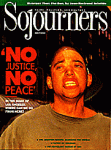Dr. Cecil L. 'Chip' Murray's First A.M.E. Church and Rev. Kenneth C. Ulmer's Faithful Central Baptist Church are both located in South Central Los Angeles. Murray's church was the meeting place for religious leaders during the riots, and a center for relief efforts and organizing. Murray and Ulmer were interviewed in LA for Sojourners by Brian Sellers-Petersen, California regional organizer of Bread for the World when this article appeared.
- The Editors
Sellers-Petersen: What are your impressions of the disturbances in Los Angeles?
Murray: They were America's wake-up call. A wake-up call is loud, insistent, annoying, and often belligerent--especially to a person who's sleeping. But the switchboard doesn't just call you capriciously. Those disturbances were sent for by two centuries of neglect of a portion of American citizens.
If the truth be told, some of those fires in LA were set by African Americans. But even as we give them credit for setting the fires, we cannot give them credit for starting the fires. Those fires were started when the framers of the Constitution set fire to the law of liberty by not including us in their proclamation. They were caused by two centuries of inequity before the law. Because anybody who makes a mockery of the law is setting fire to the household that the people live in.
Sellers-Petersen: What's the context for your churches' involvement in these events?
Murray: The black church that's legitimate is always the church beyond the walls. Black religion never omits politics. The mandate of the church is clear: Go feed hungry folks. Go heal sick folks. Go raise dead folks. Go educate unlearned folks. Go minister beyond yourself. When this confrontation occurred, we had already been prepared.
Clearly, the church at its best is inclusive, not exclusive. We're victims of 200 years of exclusion. Yet both of our churches welcome white members. Every door is open. Under the skin, all people are kin.
White America thinks it can keep black America deprived of its origin, of its history, and yet expect black America to be content. But you cannot be content until you are free as a total person: economically, politically, socially, emotionally, and morally.
Ulmer: A comment was made in The L.A. Times by a white evangelical. He said, "I'm not concerned that Rodney King get his pound of flesh. I just want him saved." I wonder what that kind of philosophy is going to say when Jesus says, "I was out-of-doors and you didn't take me in, I was hungry and you didn't feed me."
Sellers-Petersen: What role should white people of conscience play?
Ulmer: Acknowledge and confess that there is an underlying, nebulous problem. Oppression is real, racism is real. It is amazing to me how many people don't want to deal with racism. It is denial. They don't understand where the black community is coming from. And we don't understand why they don't understand....
Murray: ....because we understand where the white community is--we've lived with them and have had to understand them for economic survival.
Another thing that white people can do is to come as students. Don't transport yourself as a judge everywhere you go. Go and study.
A third contribution white people can make is to allow black people to generalize about this problem. The white liberal will say, "Well, I didn't have slaves. I didn't do this. I have best friends who are black." Well, if you get the fringe benefits of white racism, then you've also got to take the anathema of white civilization. Allow us to speak generally, knowing that you are an exception, and come on, let's get the work done.

Got something to say about what you're reading? We value your feedback!
